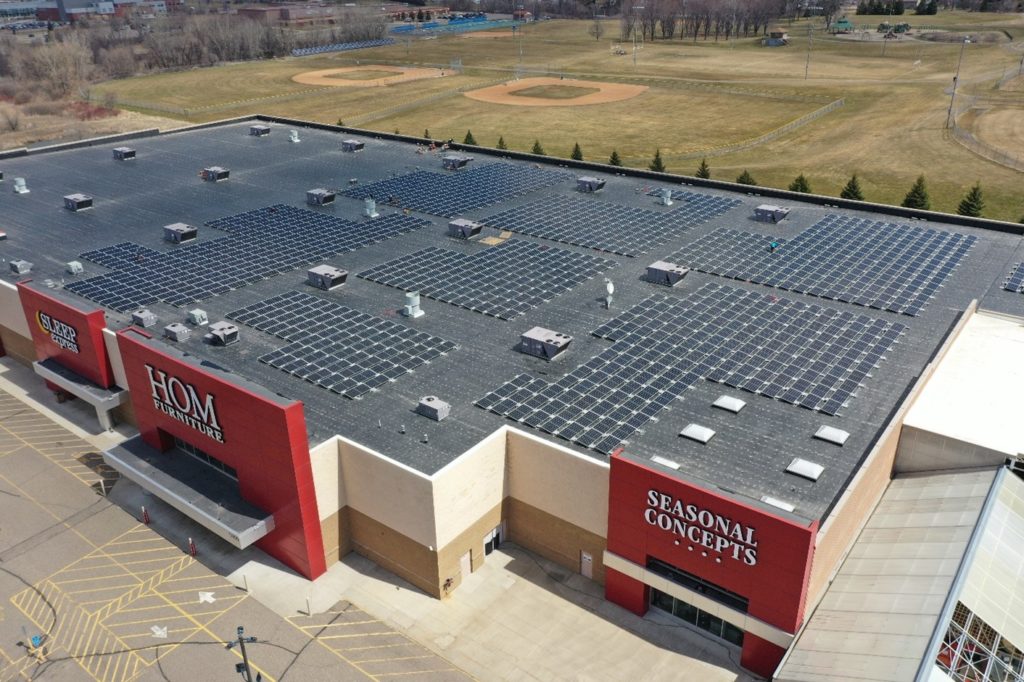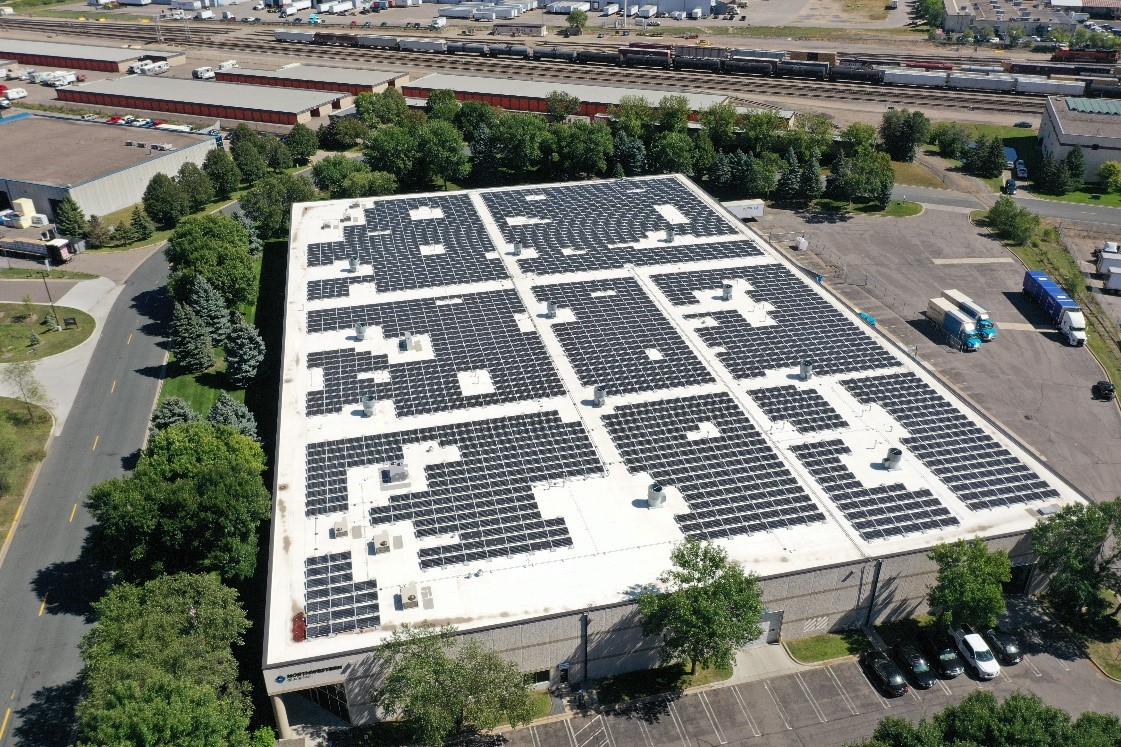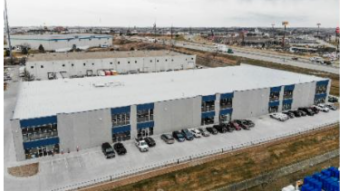When considering the ROI for solar energy, many business owners aren’t certain how to justify what they believe to be a significant investment. Part of understanding the return is realizing that businesses today are likely to receive more than 65% of their investment back through state and federal tax incentives and depreciation alone.
Additionally, a long list of utility incentives, grants and rebates make the transition to solar energy a brilliant business move in today’s economy.
Solar is more affordable than you think
How do commercial solar projects qualify for such great savings? There are several ways. The most common is through the Solar Investment Tax Credit (Solar ITC). The Solar ITC is a 30% federal tax credit claimed against the tax liability of commercial solar systems. This is a dollar-for-dollar reduction in the taxes a business would otherwise pay, effectively putting 30% of your solar investment back in your pocket.
In addition to the solar ITC, commercial businesses can take advantage of accelerated depreciation on both the federal and state levels. As an alternative to the Solar ITC, a company may choose to take advantage of the Solar Production Tax Credit (Solar PTC), which pays businesses for producing and delivering solar energy to their utility grid.

Solar is heavily weighted toward getting most of your investment back in the first few years, but even without upfront savings, a solar investment will lower operational savings immediately. Inflation and the cost of electricity are closely tied. Historical data shows that the last time inflation was more than 5% for six consecutive years, the price of electricity doubled. With inflation inarguably on the rise once more, an investment in solar is guaranteed to save you utility costs.
Let’s discuss cash flowing
Most solar investments are designed to cash flow as quickly as possible with average ROIs of three to six years.

Rick Tisdale, senior project developer at Cedar Creek Energy
“This means your system is totally paid for, after which time all of the energy you generate through your solar array is free,” said Rick Tisdale, senior project developer at Cedar Creek Energy in Blaine, Minnesota. “The solar array then becomes a major asset on your books, and in your operations.”
The bottom line is that in today’s world solar is more attainable and affordable to businesses than ever before.
Giving the people something to talk about
There are dozens of reasons to switch to solar energy, though some businesses are surprised to find that the customer-facing perception of their brand or business is one of most impactful changes to their bottom line.

Erin Traxler, Commercial Solar Project Developer with Cedar Creek Energy
“While Minnesota businesses like Hom Furniture, Aveda, Brin Glass, and many others are benefitting financially by reducing their energy expenses, they are also benefitting from the goodwill they receive from customers and vendors for being responsible, earth-friendly, corporate citizens and reducing their carbon footprint,” said Erin Traxler, Commercial Solar Project Developer for Cedar Creek Energy.
“Many of our clients pursue promotional campaigns to let people in the community know about their commitment to sustainability,” Traxler added.
While this benefit may seem more difficult to reliably quantify, a Global Sustainability study in 2021 by Simon-Kucher & Partners found that more than 50% of consumers rank sustainability in their top five reasons to work with one company over another. Test it for yourself! In an upcoming customer survey, consider asking how important it is to your customers to work with businesses committed to solar energy and other sustainability initiatives.

Rob Appelhof, Chief Executive Officer of Cedar Creek Energy
So why doesn’t every company move to solar?
With the tax savings, depreciation and other utility incentives and grants, now is the time to consider transitioning from petroleum-based energy to harnessing the power of the sun to keep the wheels moving on your business. Let’s break down the benefits of solar for your business. These are real, measurable benefits, not marketing hype:
Federal Solar Investment Tax Credit – Receive a tax credit in year one of 30% of the total solar project purchase price. Receive up to 60% for meeting other qualifications, such as installing solar panels, components, and racking comprised of at least 50% domestic materials.
Depreciation – You can depreciate your solar purchase price using the five-year MACR schedule in Minnesota, both on federal and state levels.
Safe Investment – The manufacturing equipment for solar panels is warrantied for 25 to 30 years.
Operational Savings – There is a direct replacement of kWh you would have purchased from your energy company. Even after 30 years, your solar array will be producing 85% of its original output.
Environmental Benefits – Be one of the progressive companies combating global warming by taking positive action and going solar. Solar panels produce clean energy without generating greenhouse gases.
Company PR – As you know, your company has likely fought hard to be perceived as a good corporate citizen. When you as a business owner commit to solar energy, you are showing – by acting – that you care about the environment and are doing your part to run a clean business. The messages revolve around your business making the right decision for your family, your company, your employees, your community and the environment.
Commercial solar: A lot of questions – and so many answers
The commercial solar team at Blaine-based Cedar Creek Energy is ready to answer the questions we know businesses have about making the move to solar energy. Our panel includes Rob Appelhof, CEO; Rick Tisdale, Engineer and Senior Project Developer; and Erin Traxler, Commercial Solar Project Developer.
Q. What’s the rush – Why should I invest in solar energy for my business now?
Tisdale: With the Inflation Reduction Act and so many tax incentives and rebates, some of the money is limited, and awarded on a first come first served basis. Plus, the sooner you install a solar array for your company, the sooner you will reap the benefits.
Q. Can solar energy help my business grow?
Traxler: Not only will solar panels improve your bottom line by decreasing or eliminating your monthly utility bills, but you can also reinvest the savings into other growth initiatives, capital investments, staffing, and other areas.
Q. What do I need to know about choosing a commercial solar energy company?
Appelhof: While there are several solar contractors in Minnesota, some have only recently moved into the state. What’s most important is to find a local solar company that has been in business at least 15 years with a consistent track record and stellar feedback from its customers. Look for a solid management team that has the technical and engineering experience needed for a complex commercial solar project. Make sure your solar company is completely current on all financial rebates and tax incentives to minimize your investment and maximize your ROI.
Q. Is it possible to lease a solar array?
Traxler: Actually, it is. By using a Power Purchase Agreement, your business can eliminate the cost of investing in a solar array, and in our case, Cedar Creek Energy would own the system and lease the energy savings back to you. You experience all the benefits with none of the up-front investment.
Q. Minnesota is known for its winters. How will my solar array perform in January and February?
Tisdale: Minnesota is actually one of the best states in the country for solar. There is no doubt that your system will not perform as well as it does during the other months of the year, but not just because of our weather. Because the days are shorter and the angle of the sun is lower in the sky, all solar arrays in Minnesota will have a production slump during this time of year, but it’s less than you’d think – only by about 5%. In contrast, summer months more than make up for any winter losses, producing an average additional 33% energy than other months.
Q. We will soon need Electric Vehicle (EV) charging stations for our employees and for the EVS we plan to purchase for the company. What should we consider?
Traxler: There are incentive dollars through the Inflation Reduction Act earmarked to incent businesses to support both employees’ electric vehicles and EVs the company will bring online in the future. When you are installing a commercial solar array, it makes complete sense to create the infrastructure for the EV charging stations in garages and parking lots.
Powering your business with solar energy is the wave of the future. In fact, that wave is here. Now is the time to talk to a commercial solar company to leverage and maximize all the benefits available to your company to harness the power of the sun: reap the immediate savings, incentives and rebates; promote your business as socially responsible; and solidify your commitment to being part of the global warming solution.
Rob Appelhof, CEO; Rick Tisdale, Engineer and Senior Project Developer; and Erin Traxler, Commercial Solar Project Developer, all work for Blaine, Minnesota-based Cedar Creek Energy.




